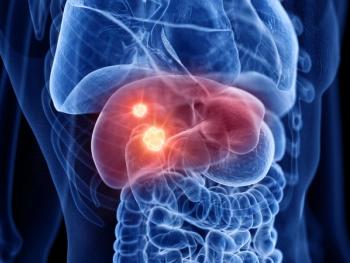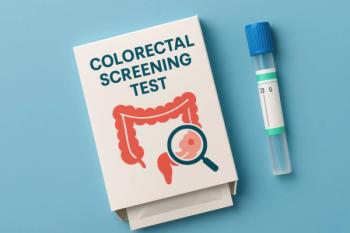
Colorectal Cancer
Latest News
Latest Videos

CME Content
More News

A study shows falling CRLM incidence and improved survival for synchronous disease, with persistent gaps for metachronous metastases.

From cutting-edge AI detection tools to rising incidence in younger adults and threats to free screenings, 2025 brought major shifts in the struggle against colorectal cancer.

High response rates, strong R0 resection, and low severe adverse events with neoadjuvant therapy plus immunotherapy were identified in a rectal cancer study.

From immunotherapy breakthroughs to early-stage scientific advances shaping the next generation of cancer care, these were the top oncology stories from AACR.

A low-energy total diet replacement program before colorectal cancer surgery helped patients lose weight safely, improved certain symptoms, and showed cost-effectiveness.

A study finds no increased risk of arterial dissections or aneurysms among patients with metastatic colorectal cancer treated with angiogenesis inhibitors.

Screening among 45- to 49-year-olds rose nearly 10-fold in hospitals after US guideline updates, but disparities persist.

A study identifies tumor stage and stoma status as key drivers of diminished quality of life among patients with colorectal cancer.

Women under 50 who consume high levels of ultraprocessed foods have a higher risk of developing early-onset conventional colorectal adenomas.

The Colorectal Cancer Alliance expands its $100 million Project Cure CRC with 3 new grants driving innovation and improving patient outcomes.

Total neoadjuvant treatment achieved high complete response and organ preservation rates in patients with stage I rectal cancer, according to a new study.

Higher dietary fiber intake was associated with a reduced risk of moderate to severe diarrhea up to 2 years after diagnosis.

Early-onset colorectal cancer (CRC) increases are linked to neuroendocrine tumor reclassification, not true adenocarcinoma growth.

Removing out-of-pocket costs for follow-up colonoscopy led to an immediate and sustained increase in utilization.

A study reveals disparities by sex, socioeconomic status, and location for colorectal cancer screenings.

Researchers identify FGFR4, FLT1, and WNT5A as key biomarkers and suggest dovitinib and nintedanib as new targeted therapies for colorectal cancer.

A 12-year study in China finds that individuals who dine out often face a higher risk of colon and rectal cancers, with obesity playing a mediating role.

A study finds rural and nonrural patients have similar follow-up times after positive stool-based DNA tests, supporting broader colorectal cancer screening access.

Colon cancer recurrence risk falls below 0.5% at 6 years post-surgery, offering a practical benchmark for defining cure, according to new research.

New research highlights caregiver perspectives to improve colorectal cancer screening access for individuals with intellectual and developmental disabilities.

National survey data show rural residents are less likely to receive colorectal cancer screening, with socioeconomic and structural barriers driving the gap.

A randomized trial shows low-dose aspirin halved recurrence rates in patients with PI3K pathway gene alterations.

Next-generation sequencing shows limited survival benefit but identifies key mutations that may inform future treatment strategies.

Novel models incorporating tumor deposits outperform tumor TNM in predicting outcomes.

A study finds that $100 rideshare rides for follow-up colonoscopy after fecal immunochemical test (FIT) doubled completion rates, reduced colorectal cancer (CRC) deaths, and lowered health care costs.
















